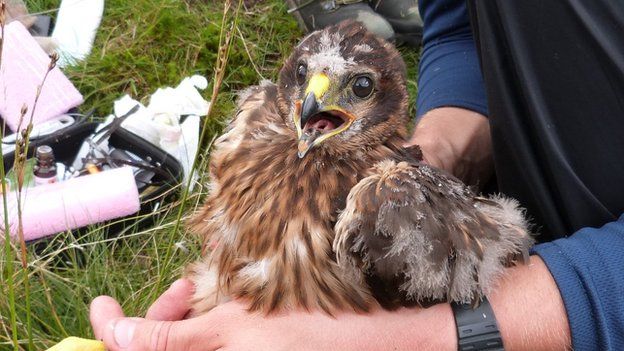Threatened birds of prey 'vanish'
- Published

Two of the rarest birds of prey in England, which had been satellite tagged, have vanished in unexplained circumstances, conservationists say.
The young female hen harriers had left their nest sites in Lancashire only a few weeks ago.
Named Sky and Hope, they were among the first hen harrier chicks to fledge in England since 2012.
Last year, no chicks were born after the only two nesting pairs failed to breed.
As part of an ongoing conservation project, Sky and Hope had been fitted with lightweight solar-powered tags.
Scientists examining the satellite data became worried when their tags stopped transmitting. Sky's signal stopped suddenly on 10 September and Hope's signal died three days later.
Searches of the area have failed to find any trace of them.
The tracking devices are designed to operate for at least three years. The scientists say it's "improbable" that this is due to technical failure. The more likely cause is that the birds were killed by other animal predators, or humans.
According to Bob Elliot, head of investigations for the RSPB: "In our experience this satellite technology is normally very reliable and it is rare for them to fail for technological reasons. Losing two birds in such a short time frame and in the same geographical area is strange."
Members of a local conservation youth group who named Hope, told the BBC that it was extremely sad that the birds had gone missing.
Kat Mayer, 16, said: "It's really disappointing, because the ones that were radio tagged could have spread awareness through the blogs and social media so people could have learned about them and been able to follow them."
Her brother Will, 13, added: "It's really upsetting. It wasn't our bird, but it was a bird that we were close to because we had named it."
Sky had been officially named and adopted by pupils from Brennand's Endowed Primary School in Slaidburn in Bowland.
Currently, 14 other fledged chicks from four sites in Bowland and the Peak District, and another undisclosed location are currently being monitored.
In 2012, a hen harrier raised in Bowland and electronically tagged, nicknamed "Bowland Betty" was found dead on Thorny Grain Moor in North Yorkshire.
She had been illegally shot and killed. The alarm had been raised after satellite data showed that she had not moved for some time.
Hen harriers were a common species across the UK up until the early 1800s, when changes in land management and intensive gamekeeping in Victorian times drove the hen harrier as a breeding species to extinction in England by 1900.
According to figures from the RSPB, between 2004 and 2010, hen harrier numbers across the UK declined by 18%.
Conservationists blame "illegal persecution" for the decline in numbers. They argue that gamekeepers on private shooting estates target the birds because they prey on red grouse.
However country groups argue that there are other causes including a loss of habitat and lack of available food. The two sides are seeking to reach an effective hen harrier recovery plan.
The RSPB is offering a £1,000 reward for any information about Hope or Sky.